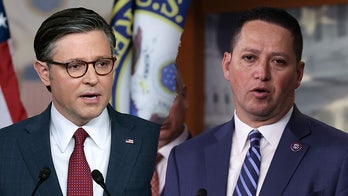Senate Republicans voted Wednesday to delay final action on a sweeping financial regulation bill, raising an obstacle to the legislation as it approached the home stretch.
The vote was 57-42, three votes shy of the 60 needed to pass. Three Democrats joined 39 Republicans in voting against the measure. Among them was Senate Majority Leader Harry Reid, who switched his vote from yes for procedural reasons. Reid said he'd seek a new vote Thursday.
With Sen. Arlen Specter, D-Pa., absent, Democrats needed one more vote to demonstrate to Republicans that they would eventually prevail and set the stage to pass the biggest rewrite of financial regulations since the Great Depression.
The legislation would set up a mechanism to watch out for risks in the financial system, create a method to liquidate large failing firms and write new rules for complex securities blamed for helping precipitate the 2008 economic crisis. It also would create a new consumer protection agency, a key point for President Obama.
Republicans this week have escalated their attacks on the legislation, arguing the bill had grown worse and did not address root causes of the 2008 financial meltdown.
The Democratic majority, said Senate Republican leader Mitch McConnell, "uses this crisis as yet another opportunity to expand the cost and size and reach of government."
While the bill appears ultimately headed for final passage, Wednesday's vote put the end game in question, including the fate of several contentious amendments that remained unresolved.
Among them was a measure that would allow states to impose their interest rate caps on financial institutions that issue credit cards. Currently, banks and credit card companies are only required to charge the interest rate permitted in the state where they are headquartered.
Banks, which have flocked to states with the most permissible rates, have vigorously fought the proposal, offered by Sen. Sheldon Whitehouse, D-R.I. Under an agreement with Republicans, the measure will require 60 votes to pass.
At the same time, Democratic Sens. Jeff Merkley of Oregon and Carl Levin of Michigan were awaiting a vote on their proposal to ban commercial banks from trading in speculative investments with their own accounts. The measure, also opposed by financial institutions, would toughen an existing provision in the bill.
While those measures would increase regulations on banks, senators also were scheduled to vote on a measure that would let auto dealers avoid any regulations passed by a proposed consumer protection agency.
Reid, by voting with Republicans, can now call for a new vote at any time.
Breaking with the party were Democratic Sens. Russ Feingold of Wisconsin and Maria Cantwell of Oregon. Feingold said the bill did not go far enough to rein in Wall Street. Cantwell's vote her inability to get a vote on her amendment to toughen controls on the complex securities known as derivatives.
"The test for this legislation is a simple one - whether it will prevent another financial crisis." Feingold said in a statement. "As the bill stands, it fails that test."
Cantwell rebuffed Reid and Senate Banking Committee Chairman Christopher Dodd, who hovered at her Senate desk during the vote in hopes of getting her to reconsider her vote.
Specter, who lost the Democratic primary in Pennsylvania Tuesday, was not in the Senate Wednesday. He had been expected to support the Democrats.
Two Republicans -- Maine Sens. Susan Collins and Olympia Snowe -- voted with the Democrats. Republican Sen. Scott Brown of Massachusetts said earlier he had told Reid he would also vote with the Democrats. But when the vote came, he sided with his party.
"A senator broke his word with me," Reid said, though he declined to identify the culprit.
Earlier Wednesday, Brown told the Associated Press: "I told him (Reid) I'd support cloture today because I'm satisfied with the process."
The Senate was expected to let stand a contentious restriction on the ability of banks to carry out their lucrative business in complex securities known as derivatives.
Senate Banking Committee Chairman Christopher Dodd decided not to propose a two-year delay on a requirement in the bill that banks spin off their derivatives business into subsidiaries.
Dodd had sought to break an impasse over how to regulate derivatives. But Sen. Blanche Lincoln, an Arkansas Democrat who has insisted on the spinoff measure, indicated she would oppose Dodd's effort. And the financial industry promptly signaled it would not support the effort.
Republican Sen. Judd Gregg of New Hampshire also blasted Dodd's proposal Wednesday, likening it to a "Mad Hatter's tea party."
The maneuvering came as an exhausted, occasionally cranky Senate tried to turn the corner on a massive bill that would impose new controls on Wall Street.




